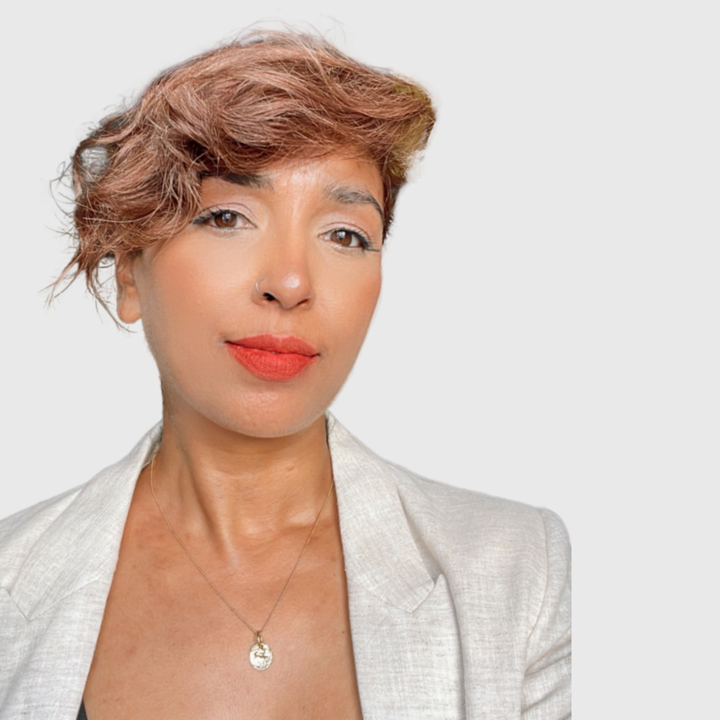
Firstly, what motivates you?
In simple terms doing something that supports people to improve their quality of life and live to their full potential.
There are many socio-economic and systemic contributors at home and work that can negatively affect someone’s experiences. And, yet collectively and individually we can make difference. I believe everyone has the power to contribute to positive change however small, to think differently, to behave differently, to align our actions with our values - to do something that improves their life and that of others.
What are your three core values?
Integrity, Freedom, and Compassion.
Tell us a little bit about your career journey, from where you started to now?
Having studied BA (Hons) Economics for Business with Psychology my career spans over 25 years with 10+ years deep experience in Global Transformation across the business including Operations, HR, Finance, L&D, Technology and Product; and most recently working in EDI and Wellbeing. This is my first step in luxury retail and I’m looking forward to immersing myself in all things Harvey Nichols.
What bought you to work in the EDI space?
In my 30s I fell ill with chronic autoimmune conditions; and during my struggles I realised I had to shift my mindset and adapt my life to move forward. Luckily, I had a great manager who was fully supportive and made adjustments for me at work, but what we didn’t have in the business was education and policy around disabilities.
This led me to study in the fields of Occupation Health & Wellbeing and then EDI. My personal journey served as the catalyst to combine my knowledge and experience in cultural transformation.
Why is EDI&W important in shaping the employee experience?
It’s essential we create psychological safety and opportunities for everyone to thrive, where society is fully represented, where people feel they belong, feel valued and can reach their full potential. Progressive EDI enables us to take actions to dismantle discrimination and inequality and gives rise to a happier and healthier work culture.
When diverse perspectives come together, it cultivates multidimensional thinking and creative design. If everyone in a company is the same i.e., they share the same background, thoughts, and identity, then we risk only adopting one approach with potentially the same outcomes. Embracing diversity and inclusion also facilities us to develop a growth mindset, be an active contributor to positive change, and to open the business to new visions.
Wellbeing is fundamental to the employee experience; it is the thread that weaves through EDI. Discrimination on any level can affect someone emotionally, mentally, and physically; the World Health Organization cites “depression is a leading cause of disability worldwide. Poor working environments – including discrimination and inequality pose a risk to mental health. Globally, an estimated 12 billion working days are lost every year to depression and anxiety”.
Wellbeing isn’t just focussed on mental health, it also encompasses social, economic, environmental contributors and unhealthy habits which can affect an employee’s experience. Continuous improvement in policies, environment, and behaviours empowers individuals and companies to support and promote wellbeing at work.
Is data important in these conversations?
Absolutely. Poor data or a lack of data is certainly a barrier to progress, without it we don’t have clear visibility of our D&I landscape.
Gathering data on the composition of our workforce such as disability, ethnicity, social mobility, wellbeing, et all is a key enabler for us to make structural changes. Underpinned by robust frameworks and confidentiality that safeguard employees and their privacy, it drives inclusive decision making where people feel their voices are heard and their contribution has made an impact. For this to be successful we have to engage in two-way conversations, be advocates, listen, learn, lead with empathy, and take meaningful action to support the employee experience.
Pathways such as the employee network groups and forums are also essential contributors here. They offer space for people to share experiences, amplify voices and come together in unity – in turn offering a broader and deeper lens of our cultural environment.
What is Pun’am life outside of work?
I’m a wellbeing coach, health equity advocate, and a trauma informed yoga, qigong & mindfulness teacher; I specialise in immune and emotional health to develop mental and physical resilience.
The focus of my personal work over the past decade has been on understanding the overlapping discourses of dis-ease, social identity, belonging, emotional stressors and mental health.
I’m certified Yoga4Health Teacher. Accredited by the Personalised Care Institute – the body set up by the Royal College of GPs and NHS Improvement to deliver yoga in the areas of social prescribing and social care. This work is extremely important to me, and I currently support my local Dementia community group and offer support to people living with autoimmune disease.
Tell us a random fact about yourself?
I studied at the London College of Fashion.
What’s your favourite item of clothing?
My trainers, favourite styles are 80s running shoes.
What are your impressions so far?
To start, I’d wanted to say I’m delighted to have joined Harvey Nichols on the journey to embed Equity, Diversity, Inclusion, and Wellbeing in the heart and DNA of our company. I’ve had such a warm welcome from everyone across the group, and struck by the immense passion, focus, and dedication everyone’s shared whilst navigating post pandemic and economic challenges.
The Group Diversity Forum and Wellbeing Teams have been a joy to meet with, they’ve been leading the charge and delivered a wide range of initiatives setting us in right direction.
Earlier in the month I also had an opportunity meet with the British Retail Consortium and Inclusive Employers both offering insights and strategies that we can learn from.
I’m looking forward to supporting our employees and the business to progress our Equity, Diversity, Inclusion, and Wellbeing journey.
Sum up in three words how we can support EDI&W?
Allyship, Commitment and Collaborative Action.